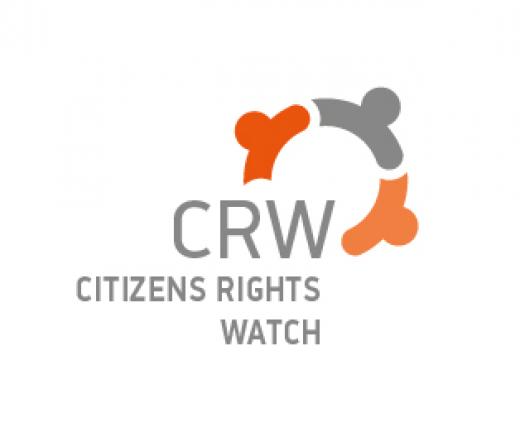In consideration of the International Women's Day which is globally celebrated on 8th of March, CITIZENS RIGHTS WATCH (CRW) traces back to the past achievements on the empowerment of women’s rights and asks you to join us in the effort to empower women’s rights.
All core international human rights treaties address in their provisions gender equality as a fundamental principle under international human rights law. The Universal Declaration of Human Rights (UNDHR) adopted in 1948 asserts that “all human beings are born free and equal in dignity and rights” (Art. 1, UNDHR) and “everyone is entitled to all the rights and freedoms set forth in [the] Declaration, without distinction of any kind, such as race, colour, sex, language, religion, political or other opinion, national or social origin, property, birth or other status” (Art. 2, UNDHR).
Article 3 of the International Covenant on Economic, Social and Cultural Rights (ICESC) and Article 3 of the International Covenant on Civil and Political Rights (ICCPR) guarantee that both women and men should equally enjoy civil, political, social, economic and cultural rights.
In 1972, the UN General Assembly (UNGA) adopted the resolution 3010 (A/RES/27/3010) stating “1975” as the “International Women’s Year”. In 1975, the Commission on the Status of Women called for the first world conference on women “World Conference of the International Women's Year”, which took place in Mexico City resulting to the adoption of the UN resolution “Declaration of Mexico on the Equality of Women and Their Contribution to Development and Peace”. The resolution established principles on gender equality. The same year, years 1976-1985 were proclaimed by UNGA as the "Decade of Women" under the resolution 31/136 (A/RES/31/136).
In 1979, the Convention on the Elimination of all Forms of Discrimination against Women (CEDAW) was adopted by UNGA. Apart from Somalia, South Sudan, Sudan, Tonga, Holy See and Iran that have not signed the treaty and the United States and Palau that have signed, but not ratified it yet, CEDAW has been ratified by 188 states since its adoption.
CEDAW is one of the most important international treaties on women’s rights and it has been described as an international bill of rights for women. In its provisions, CEDAW establishes a plan of action aiming to bring an end to any kind of discrimination against women.
Moreover, the second world conference “World Conference of the United Nations Decade for Women” that was held in Copenhagen in 1980 had goal to evaluate the implementation of the objectives set in the first World Conference. The conference concentrated on the improvement of women’s rights in conjunction to health, employment and education.
Five years later, the “World Conference to Review and Appraise the Achievements of the UN Decade for Women: Equality, Development and Peace” in Nairobi which was the third conference on women’s rights adopted the Nairobi Forward-Looking Strategies for the Advancement of Women promoting gender equality and calling for women’s equal involvement in political and social matters.
Throughout the years, the international women’s rights movement achieved some great steps forward for the realization of women’s rights as human rights. In 2015, the International Women’s day emphasizes and reminds us the adoption of the Beijing declaration and Platform of Action during the Fourth World Conference on Women that took place in Beijing, China in 1995. Signed by 189 governments, the Declaration and Platform for Action is an inspiring agenda that declared women’s rights as human rights, concentrating on the realization and empowerment of women’s rights and gender equality. This year’s UN theme is "Empowering Women - Empowering Humanity: Picture It!”!
Nowadays, the women’s rights movement for recognition of equality and the general issue of women’s rights as human rights are globally acknowledged as a unique human rights matter of concern.
However, the implementation of the law is still weak. As United Nations Population Fund (UNPFA) notes “Many of the countries that have ratified CEDAW still have discriminatory laws governing marriage, land, property and inheritance”.
Numerous women and girls around the world face discrimination, violence and abuse not only within their communities but also within their workplaces and households. Many of them have limited access to education and little participation in the political life of their countries. According to UNPFA “Worldwide, women are twice as likely as men to be illiterate. […]Despite some progress in women’s wages in the 1990s, women still earn less than men, even for similar kinds of work.”
Discrimination, violence, trafficking, sex slavery, sexual assault, early marriage, female genital mutilation, domestic abuse and the deprivation of their reproductive rights are common issues that women are daily called to confront.
According to the United Nations Children’s Fund (UNICEF) one out of 4 women has married before her 18th birthday, the number of girls and women that have been subjected to FGM reaches 130 million globally while approximately “120 million girls worldwide have experienced forced intercourse or other forced sexual acts at some point in their lives”.
CRW is working towards the recognition of women’s empowerment and gender equality. We support the women’s right to personal autonomy and we ask everyone to join us in the effort to promote legal and policy reforms for the improvement and empowerment of women’s rights!
Contact: Ms. Athanasia Zagorianou, LLM
Researcher & Member, CRW Trustees Council
zagorianoua@gmail.com
References
United Nations Children’s Fund (2014). Hidden in Plain Sight: A statistical analysis of violence against children. New York: UNICEF
UNFPA (2015) “This International Women’s Day marks 20 years of progress” Available at: http://www.unfpa.org/news/international-women%E2%80%99s-day-marks-20-years-progress
UNFPA (2006) “The Human Rights of Women” Available at: http://www.unfpa.org/resources/human-rights-women
UN Women “Beijing and its Follow-up” Available at: http://www.un.org/womenwatch/daw/beijing/


 Athanasia Zagorianou
Athanasia Zagorianou
Post a comment